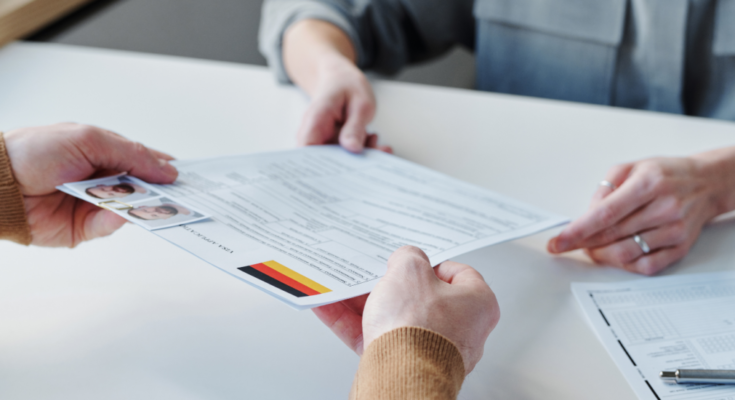Germany Visa Requirements: Germany has become a prime destination for immigrants seeking new opportunities. Understanding the specific visa requirements is crucial to a smooth transition.
This guide outlines the necessary steps and criteria to secure a student or business visa, helping you embark on your German journey with confidence.
Types of Germany Visas Available for Immigrants
Germany offers a variety of visa types to accommodate the diverse needs and purposes of immigrants. Each visa type is tailored to specific conditions, ensuring that applicants can find a pathway that best suits their situation. Here’s a breakdown of the main types of Germany visas available for immigrants:
- Tourist and Visitor Visa: This visa is designed for individuals who wish to visit Germany for leisure or to see family and friends. It is typically valid for short stays up to 90 days.
- Business Visa: Ideal for those who need to attend business meetings, conferences, or conduct short-term business activities in Germany. This visa also allows for stays of up to 90 days.
- Student Visa: For international students accepted into German educational institutions, the Student Visa is a must. It allows students to reside in Germany for the duration of their academic program.
- Job Seeker Visa: This visa permits individuals to enter Germany for the purpose of seeking employment. Valid for up to six months, it does not allow the holder to work until they secure a job and convert to a residence permit.
- Working Visa: Tailored for individuals who have already secured employment in Germany, this visa is necessary for entering and staying in the country to commence work.
- Family Reunion Visa: Designed to reunite families, this visa allows non-EU/EEA relatives of German residents to live in Germany.
- Blue Card EU for Germany: A special visa for highly skilled professionals with a university degree, who have a job offer with a high salary compared to the German average.
- Freelancer Visa: For freelancers and self-employed individuals wanting to establish a business or offer services in Germany, this visa provides the necessary legal basis to reside and work in the country.
However, each visa has specific requirements based on the applicant’s purpose of stay, nationality, and other criteria. It’s important for applicants to carefully review the conditions for each visa type to ensure compliance and increase the likelihood of approval.
General Visa Requirements for Germany
When planning to travel to Germany, whether for studying, business, or tourism, understanding the general visa requirements is crucial. Here’s a breakdown of the essential documents and common criteria applicable to all visa types, ensuring you’re well-prepared for your application.
Essential Documents Needed for Any Visa Application
- Valid Passport: Your passport should be valid for at least three months beyond your period of intended stay in Germany, with at least two blank pages available for visa stamps.
- Application Form: Fully completed and signed visa application form. Each visa type has a specific form which can be downloaded from the official German Visa website.
- Photographs: Two recent biometric passport-size photographs that comply with German standards.
- Proof of Travel: A detailed itinerary of your trip including travel reservations, hotel bookings, and plans while in Germany.
- Travel Health Insurance: Proof of a valid travel health insurance covering your entire stay in Germany with a minimum coverage of 30,000 euros.
- Proof of Financial Means: Documents that show you have sufficient funds to support yourself during your stay. This could be bank statements, a sponsorship letter, or a combination of both.
- Cover Letter: Explaining the purpose of your visit to Germany and your itinerary.
- Supporting Documents: Depending on the visa type, additional documents such as an invitation letter, proof of employment, educational certificates, etc., may be required.
Common Criteria Applicable Across All Visa Types
- Non-Criminal Record: Applicants must generally provide a certificate proving they have no criminal convictions.
- Purpose of Visit: Clear and credible explanation of the reason for your visit and your plans during your stay in Germany.
- Return Willingness: Evidence that you intend to return to your home country after your visit. This can be shown through ties like family, employment, or property in your home country.
- Compliance with Entry Conditions: Compliance with the entry conditions for the Schengen Area, including not being considered a threat to public policy, internal security, public health, or the international relations of any of the Schengen states.
By ensuring you meet these general visa requirements and have all the essential documents in order, your application process will be smoother and more straightforward.
Step-by-Step Guide to Applying for a German Visa
Applying for a German visa can seem daunting, but with the right preparation, you can navigate the process smoothly. Here’s a detailed, step-by-step guide from scheduling an appointment to attending the visa interview, ensuring you are well-prepared for a successful application.
1. Determine the Type of Visa You Need
Before you can schedule an appointment, determine which type of German visa suits your travel needs. Whether it’s a student, business, or tourist visa, each category has specific requirements and documentation.
2. Schedule an Appointment
Visit the official website of the German consulate or embassy in your country to schedule an appointment. It’s advisable to book your appointment well in advance as slots can fill up quickly, especially during peak travel seasons.
3. Prepare Your Documentation
Gather all the necessary documents. Typically, this includes your passport, completed application form, photographs, travel itinerary, proof of accommodation, travel insurance, and any other documents relevant to your visa type.
4. Complete the Visa Application Form
Fill out the application form carefully. Ensure all information is accurate and corresponds with the details in your supporting documents.
5. Pay the Visa Fee
Pay the required visa fee at the time of your application. This fee is non-refundable, even if your visa application is not successful.
6. Attend the Visa Interview
Go to your scheduled visa interview with all the required documents. Be punctual, dress formally, and prepare to answer questions about your trip, background, and purpose of visit sincerely and clearly.
7. Track Your Visa Application
After the interview, you can track the status of your visa application online. Processing times can vary, so it’s important to apply well ahead of your planned travel date.
Tips for a Successful Visa Application
- Double-check your documents: Ensure all your documents meet the specific requirements stated by the embassy or consulate.
- Practice for the interview: Familiarize yourself with common visa interview questions and practice your responses.
- Be honest and concise in your interview: Provide clear and honest answers to all interview questions; avoid unnecessary details unless asked.
- Follow the application guidelines strictly: Adhering to all the application guidelines demonstrates your seriousness and increases your chances of success.
By following these detailed steps and tips, you can prepare effectively for your German visa application, boosting your chances of approval.
Special Considerations for Immigrant Germany Visas
When applying for long-term visas to Germany as an immigrant, there are specific requirements and considerations that must be addressed. Understanding these can streamline your application process and increase your chances of approval.
Long-Term Visa Requirements
Settlement and Integration Measures: Germany places a strong emphasis on the integration of immigrants into society. Applicants for long-term visas, such as settlement visas, may be required to demonstrate their commitment to integration. This could include:
- Integration Courses: Participation in courses that cover the German language, legal system, culture, and history is often mandatory.
- Proof of Accommodation: Showing that you have a place to live that meets all local living standards is essential.
- Economic Activity: If applicable, demonstrating the ability to contribute economically through job offers or business plans can be beneficial.
Language Requirements
German Language Proficiency: For most long-term visas, proving proficiency in the German language is crucial. The required level can vary depending on the visa type but generally involves:
- Certificate of Proficiency: Applicants may need to provide certification, such as the TestDaF or Goethe-Institut certificates, demonstrating language skills at the B1 or higher level as per the Common European Framework of Reference for Languages (CEFR).
Financial Requirements
Proof of Financial Stability: Demonstrating financial stability is vital to secure a long-term visa. Requirements include:
- Bank Statements: Recent statements that show sufficient funds to cover your living expenses for the duration of your stay.
- Income Evidence: Documents such as salary slips or an employment contract if you are to be employed in Germany.
- Health Insurance: Proof of a valid health insurance coverage that is acceptable in Germany.
By carefully preparing and providing the necessary documentation related to settlement, language proficiency, and financial stability, you can enhance your application for a long-term immigrant visa to Germany.
Common Mistakes to Avoid in the Germany Visa Application Process
Applying for a Germany visa can be a detailed and demanding process. To increase your chances of a successful application, it’s crucial to avoid common mistakes. Here are some frequent errors applicants make and tips on how to avoid them:
1. Incomplete Application Forms
Many applicants fail to fill out the application forms completely or accurately. This oversight can lead to delays or even rejections.
How to Avoid: Double-check all forms for completeness and accuracy. Use a checklist to ensure every section is filled out correctly.
2. Insufficient Supporting Documents
Failing to provide the necessary documents is a common error that can cause your application to be denied.
How to Avoid: Carefully review the document requirements for your specific visa type. Gather and organize all required documents before submitting your application.
3. Inaccurate Information
Providing incorrect or inconsistent information on your application can result in rejection.
How to Avoid: Be truthful and consistent in all your responses. Cross-check your information to ensure there are no discrepancies.
4. Not Applying Early Enough
Waiting until the last minute to apply for your visa can result in unnecessary stress and potential delays.
How to Avoid: Submit your application well in advance of your planned travel date. Aim for at least 3 months ahead.
5. Ignoring Visa Requirements for Specific Types
Each type of visa has specific requirements that must be met. Ignoring these can lead to rejection.
How to Avoid: Understand the requirements for the specific visa you are applying for. Tailor your application to meet these requirements precisely.
6. Poor Interview Preparation
Many visa applications include an interview component. Lack of preparation can negatively impact your chances.
How to Avoid: Prepare thoroughly for your visa interview. Practice common questions and ensure you can clearly explain your purpose of travel and plans in Germany.
7. Overlooking Health Insurance Needs
Health insurance is often a mandatory requirement for visa approval.
How to Avoid: Secure adequate health insurance that meets the visa requirements. Provide proof of insurance with your application.
8. Ignoring Financial Proof Requirements
Demonstrating financial stability is crucial for most visa applications.
How to Avoid: Ensure you have sufficient funds and proper documentation to prove it. Bank statements, sponsorship letters, and other financial documents should be up-to-date and accurate.
9. Incorrect Visa Category Application
Applying for the wrong type of visa is a common mistake that can result in rejection.
How to Avoid: Determine the correct visa category for your travel purpose. Consult with immigration experts if necessary to ensure you apply for the right visa.
By being aware of these common mistakes and taking steps to avoid them, you can enhance your chances of obtaining a Germany visa smoothly and successfully. Always remember, thorough preparation and attention to detail are key to a successful visa application process.
Legal and Administrative Support for Immigrants in Germany
Finding the right legal and administrative support is crucial for immigrants in Germany. Whether you’re seeking guidance on residency permits, employment laws, or citizenship processes, there are numerous organizations dedicated to assisting you. Here, we outline essential resources and organizations that provide support to immigrants in Germany.
Where and How to Get Legal Help
- Local Ausländerbehörde (Foreigners Office): Your first point of contact for residency permits, visa applications, and registration should be the local Foreigners Office. They offer guidance specific to your locality.
- Caritas Germany: This organization offers a wide range of services including legal advice, integration support, and language classes. Caritas has branches throughout Germany and provides help in various languages.
- Diakonie: Another major organization offering legal services, especially in asylum and refugee law. Diakonie can help with legal advice, social work, and integration programs.
- Pro Asyl: Focused on the rights of refugees and asylum seekers, Pro Asyl provides legal assistance and advocates for refugee rights at both the national and international levels.
- Refugee Law Clinics: Many universities in Germany host Refugee Law Clinics, where law students offer free legal advice under the supervision of licensed lawyers, particularly in areas related to asylum and immigration law.
List of Immigrant Support Organizations in Germany
- The German Red Cross (Deutsches Rotes Kreuz): Provides a variety of services to immigrants, including family reunification, language courses, and vocational training.
- Migration Hub Network: Offers resources and community support for immigrants and fosters collaboration among various migration-related initiatives in Germany.
- Integrationskurse (Integration Courses): Funded by the German government, these courses help immigrants learn German and familiarize themselves with German culture, legal systems, and history.
- InfoMigrants: A news and information platform that provides practical advice on legal matters, living in Germany, and personal stories from other immigrants.
- Beratungsstellen (Counseling Centers): Located across Germany, these centers offer advice and assistance on issues ranging from legal rights to everyday life in Germany.
However, utilizing these resources can significantly ease the transition into German society for immigrants, providing them with the necessary tools to understand their rights and obligations.
FAQs about Germany Visa Requirements
What are the basic requirements for a German visa?
To apply for a German visa, you need a valid passport, completed application forms, recent passport-sized photos, travel insurance, proof of accommodation, a cover letter explaining the purpose of your visit, proof of financial means, and a flight itinerary. Depending on your visa type, additional documents may be required.
How do I prove financial sufficiency for my trip to Germany?
You can prove financial sufficiency by providing bank statements, a sponsorship letter if someone else is funding your trip, or proof of income like salary slips. The amount required varies depending on the length and purpose of your stay but generally revolves around €45 per day.
Do I need a visa for short visits to Germany?
Citizens from many countries do not need a visa for short stays of up to 90 days in Germany and the Schengen area. However, nationals from countries that do not have a visa liberalization agreement with the EU will need to obtain a Schengen visa for such visits.
Can I work in Germany with a tourist visa?
No, a tourist visa does not permit you to work in Germany. If you intend to work, you must apply for a national visa appropriate for employment or a Blue Card, depending on your qualifications and the nature of the job.
How long does it take to process a German visa application?
The processing time for a German visa can vary but generally takes about 10 working days. However, it can take longer during peak travel seasons or for certain nationalities. It is advisable to apply well in advance of your planned trip.
What should I do if my German visa application is denied?
If your visa application is denied, you will receive a refusal letter explaining the reason for the decision. You have the right to appeal within a specified period, usually within one month of receiving the refusal notice. The appeal process can be detailed in the refusal letter.
Is travel insurance mandatory for a German visa?
Yes, travel insurance is mandatory for all travelers applying for a Schengen visa. The insurance must cover medical emergencies and repatriation for at least €30,000 and be valid throughout the Schengen area for the duration of your stay.
Can I extend my German visa while in Germany?
It is possible to extend a German visa under specific circumstances, such as force majeure or humanitarian reasons, but it is generally not possible to extend a short-stay Schengen visa. For longer stays, you would need to apply for a national visa or a residence permit based on your situation.
Conclusion
In summary, adhering to German visa requirements is essential for a smooth and successful entry into Germany. Compliance ensures you meet all legal conditions, avoiding potential delays or complications in your travel or residency plans.
To stay updated with the most accurate and current visa regulations, it’s crucial to regularly consult official resources such as the German Embassy or Consulate websites.
By staying informed, you can navigate the visa application process more effectively and ensure your travels are hassle-free. Remember, regulations can change, so keeping abreast of the latest information is key to a successful visit to Germany.
References
For a comprehensive understanding and verification of the information regarding visa requirements for Germany, the following resources are invaluable. These sources are renowned for their credibility and up-to-date content, ensuring that readers have access to the most reliable information:
- German Federal Foreign Office – Offers official guidance and detailed requirements for all types of visas for entry into Germany. Visit the German Federal Foreign Office.
- Schengen Visa Info – Provides extensive information on the Schengen visa, including requirements specifically for Germany, application procedures, and tips for successful visa approval. Explore Schengen Visa Info.
- European Commission – Migration and Home Affairs – This site offers insight into the broader context of European migration policies and specific details about visa requirements for entering Germany. Read more at the European Commission.
These resources will help ensure that you have the most accurate and comprehensive information needed for traveling to Germany.



